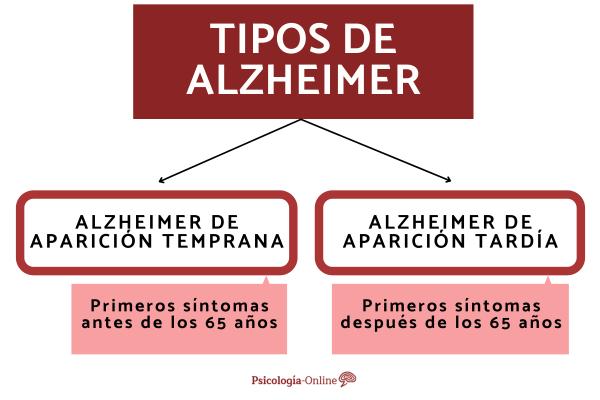Each important situation is fixed in our memories, in this way, we have the possibility of remembering specific events. After all, short and long term memory is a characteristic of human beings. Who doesn’t remember a moment from their childhood? Don’t we remember what our grandparents’ faces looked like? Who doesn’t remember the birth and name of their children? The ability to remember can be a fundamental driving force in a person’s life.
However, on certain occasions it may happen that a person does not remember situations, people and/or places due to a problem that affects their daily life. This can have various consequences that influence interpersonal relationships. Being able to understand this problem can help us cope with these types of difficulties in a different way. Do you want to know more about this? In this PsychologyFor article we will provide you with information about the types of Alzheimer’s.
What is Alzheimer’s
When we talk about Alzheimer’s, we are referring to a neurological disease that generates a progressive deterioration in brain cells associated with memory. It should be noted that Alzheimer’s is a type of organic pathology that can be present in both women and men from 65 years of age on average.
However, there may be factors that alter the course of the disease depending on the characteristics of each person. Due to these circumstances, it is important to understand how many types of Alzheimer’s its causes and its particular qualities.

early onset Alzheimer’s
The main characteristic that this type of Alzheimer’s entails lies in the moment of appearance of the symptoms of the disease. As a general feature, here the first manifestations of behaviors, emotions and thoughts usually occur before 65 years of age.
Causes of early-onset Alzheimer’s
It is crucial to be able to understand the causes associated with this type of Alzheimer’s in order to carry out an accurate diagnosis regarding the problem in question. In the following items, we will display the main causes linked to early-onset Alzheimer’s:
Genetic factors
Genetic mutations in some of the chromosomes that make up the human being are associated with breakdown of a protein called amyloid. This particularity has an impact on the performance of a person’s memory.
In turn, genetic inheritance plays a fundamental role since genes are transmitted from mother or father to offspring. In other words, if a parent has developed early-onset Alzheimer’s, it is possible that other family members have the same disease.
Social factors
Here can be included the eating habits, physical and mental activity. In other words, the way in which these areas are carried out is directly related to the emergence of early-onset Alzheimer’s.

Symptoms of early-onset Alzheimer’s
Early detection of the symptoms involved in this type of Alzheimer’s can result in a better prognosis for this type of pathology. Because of this, we will describe the main symptoms of early-onset Alzheimer’s:
- Loss of information learned recently.
- Difficulties in resolving everyday situations.
- Loss of notion of time and space.
- Difficulty in understanding of objects and situations.
- Variations in mood.
Despite the symptoms just described, it is important to clarify that the presence of any of them does not necessarily imply that we are dealing with early-onset Alzheimer’s disease. The diagnosis should always be carried out by a health professional that evaluates the characteristics of each patient.
If you want to know more about the manifestations of this type of degenerative disease, consult our article Alzheimer’s: what it is, symptoms, causes, phases and treatment.
late-onset Alzheimer’s
This type of Alzheimer’s has as its main quality the fact that the emergence of symptoms begins after 65 years of age. Like early-onset Alzheimer’s, it is a degenerative disease that develops gradually and affects different daily activities that the person carries out.
Causes of late-onset Alzheimer’s
It is important to take into account the origin of this type of Alzheimer’s since this may allow a better approach to the difficulties that this disorder imposes. Next, we will locate the main causes:
- Genetic factors : genetic inheritance is associated with the onset of the symptoms of this clinical condition. For this reason, it is possible that a family member of the affected person has had a late-onset type of Alzheimer’s. For this reason, genes appear as one of the most important causes.
- Social factors : While not completely proven, there is a possibility that the lifestyle that the person develops influences the emergence of this pathology. Here it is important to take into account diet, interpersonal relationships, physical and mental activities.

Symptoms of late-onset Alzheimer’s
The manifestations that lead to the course of this type of Alzheimer’s correspond to a fundamental area that must be taken into account. For this reason, we will explain the most relevant symptoms:
- Difficulties in problem solving.
- Memory loss in the short and long term.
- Variations in humor.
- Temporal and spatial disorientation.
- Difficulties in using words.
As we have mentioned previously, professional judgment must be considered to establish an adequate diagnosis that reflects the person’s problem. If you want more information about this pathology, read our articles How to treat a person with Alzheimer’s and Why do Alzheimer’s patients cry.
This article is merely informative, at PsychologyFor we do not have the power to make a diagnosis or recommend a treatment. We invite you to go to a psychologist to treat your particular case.
If you want to read more articles similar to Types of Alzheimer’s we recommend that you enter our Clinical Psychology category.
Bibliography
- Fidel Romano, M., Nissen, MD, Del Huerto Paredes, NM, Parquet, CA (2007). Alzheimer disease. Postgraduate Magazine of the 6th Chair of Medicine, 175 (1), 9-12.









